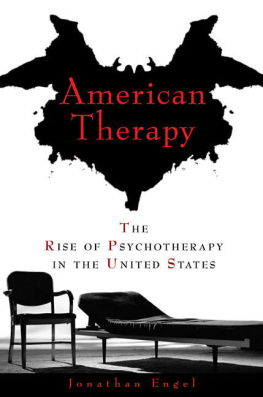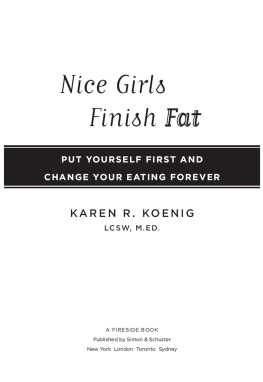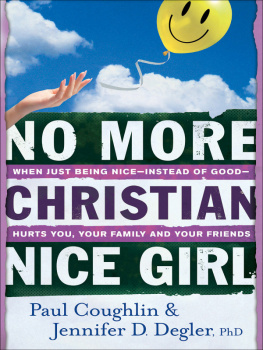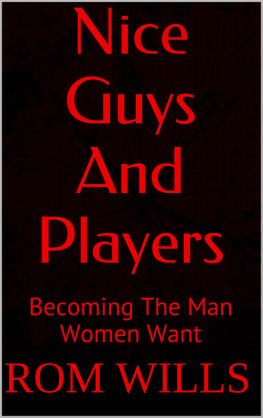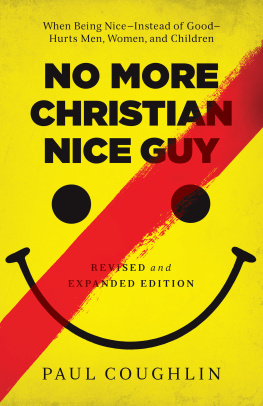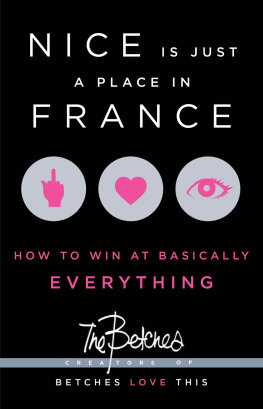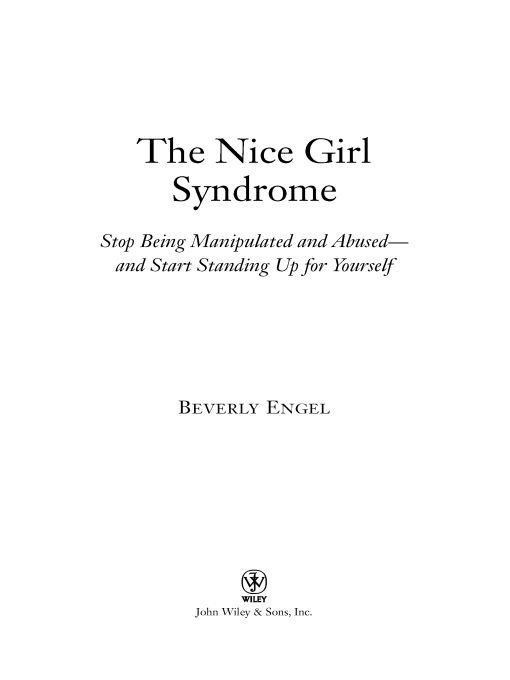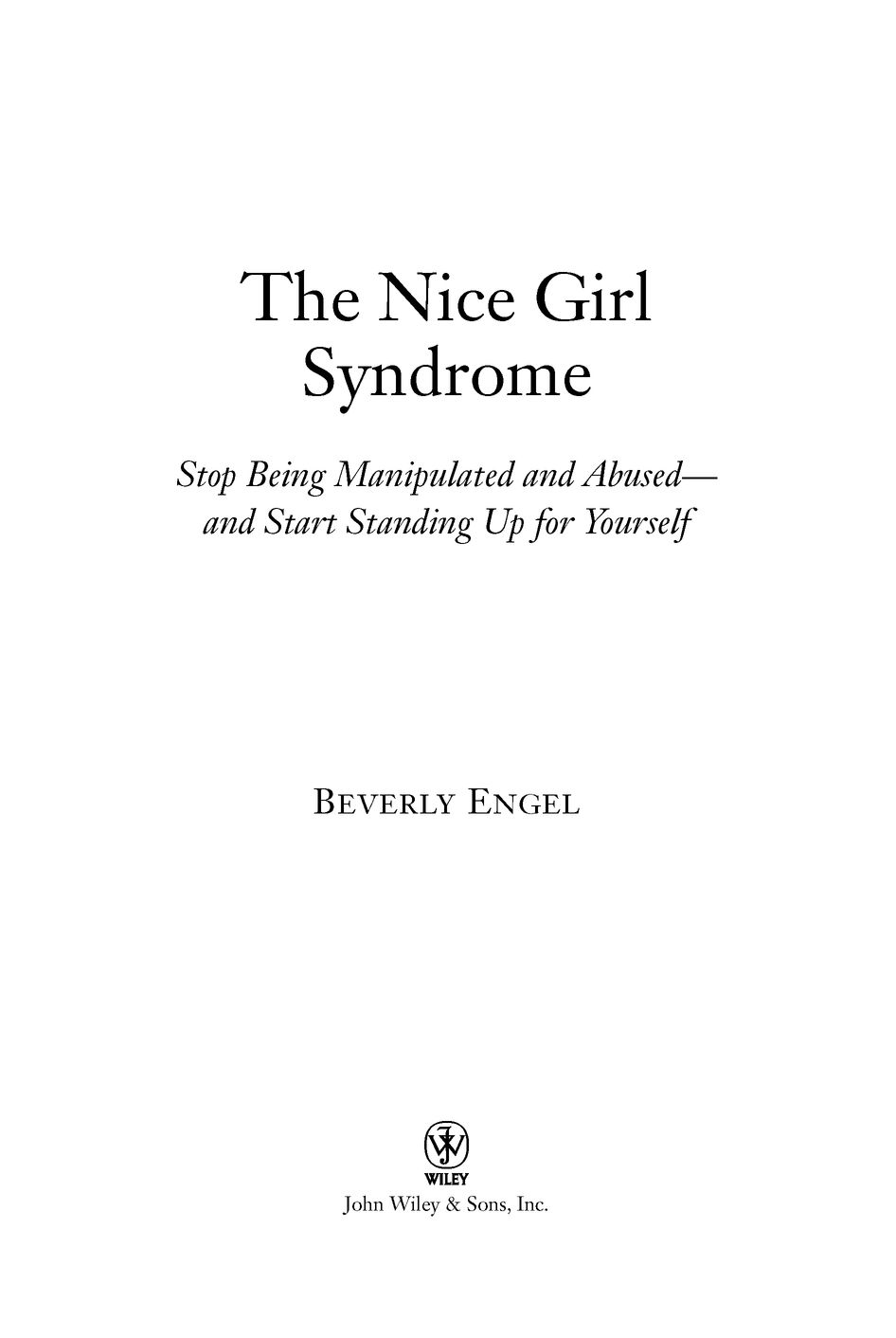Table of Contents
This book is dedicated to the many women in the world who still believe they have to be nice in order to be loved, accepted, taken care of, and safe. It is also for all the womens advocates who work so diligently to help women understand that it is better to be strong than to be nice.
Acknowledgments
Once again, I wish to thank my agents, Stedman Mays and Mary Tahan, and my editor at Wiley, Tom Miller. Thanks also to production editor Lisa Burstiner, who always does a wonderful job of editing my work. I appreciate your thoroughness and your restraint. I am extremely grateful to all of you for making it possible for me to have a second life in publishing. This will be our eighth book together, and I think we make a great team!
My heartfelt gratitude goes to the women researchers who gave this book its backbone: Carol Gilligan, Anne Campbell, Susan Faludi, Mary Pipher, and Rachel Simmons.
I also wish to acknowledge the work of Laurel Mellin, who has created an incredible program for helping people to rid themselves of false beliefs. It is her concept of positive and powerful statements that I included in this book. I highly recommend her program and her book The Pathway: Follow the Road to Health and Happiness.
Last but certainly not least, I want to thank all the Nice Girls I have worked with throughout the years. Your courage and determination to become Strong Women inspired me to write this book.
Introduction
In this day and age, you would think that women would have learned enough about assertiveness, boundaries, and codependency that they wouldnt continue to be used and abused. There certainly are enough books on the subjects. So why is it that women continue to be victimized and taken advantage of by lovers, partners, family members, friends, and co-workers?
The main reason certainly lies in the fact that we still allow abusive men to mistreat women. Although there has been some progress when it comes to exposing and treating abusers, there are still far too many men who believe they have the right to abuse their women.
Weve come a long way since the time when men believed that their wives and daughters were their property and they had the right to treat them any way they saw fit. But there needs to be more pressure put on abusive men to get the treatment they need.
In spite of a great deal of public education, we are still dealing with a huge problem when it comes to the abuse of women. Statistics tell us that women continue to be abused in record numbers. For example:
The American Medical Association estimates that over 4 million women are victims of severe assaults by boyfriends and husbands each year.
Around the world, at least 1 in every 3 women has been beaten, coerced into sex, or otherwise abused in her lifetime.
Nearly one-third of American women (31 percent) report being physically or sexually abused by a husband or a boyfriend at some point in their lives.
Approximately 1 in 5 female high school students report being physically and/or sexually abused by a dating partner.
Three in 4 women (76 percent) who reported that they had been raped and/or physically assaulted since age eighteen said that a current or former husband, cohabitating partner, or date committed the assault.
Nearly one-fifth of women (18 percent) reported experiencing a completed or attempted rape at some time in their lives.
Annually in the United States, 503,485 women are stalked by an intimate partner. Seventy-eight percent of stalking victims are women.
In addition to there not being enough done to expose and treat abusive men, I propose that another reason women continue to be victimized is that they are too nice for their own good. This niceness attracts the wrong kind of people and sends the message that these women are easy targets to be taken advantage of, controlled, and even emotionally, physically, and sexually abused. It also prevents women from standing up for themselves and keeps them in relationships that are unhealthy or abusive.
During my long career as a psychotherapist, Ive often heard clients describe painful, shocking, and even bizarre experiences. After thirty years of practice, specializing in abuse, I have become somewhat hardened to just how cruel we human beings can be to one another. And yet there is something that I never seem to get used to: how often women put up with unacceptable, often horrible treatment from others, especially men. Every time I hear a woman describe the mistreatment, abuse, even sadistic cruelty that she has endured, it saddens me. Although I know the answers, I often find myself thinking, Why does she put up with this? Even more upsetting to me is that often these women are worried about their abusive partners. I dont know what hell do without me, they frequently respond when we talk about their getting out of the abusive relationship. Or, I know that my leaving will kill him. He cant stand to be alone. In the midst of their own personal crises, they are more worried about their abusive partners than they are about themselves.
Ive written numerous books, many about recovering from some form of abuse. In most of those books, in addition to offering survivors advice and strategies on how to cope with or get away from an abuser, I have asked them to look at their part in the situation. Always stressing that I do not mean to blame the victim in any way, I encourage them to look for the reasons they have stayed in an abusive relationship and why they chose an abuser in the first place. In this book, I will ask victims and survivors to go one step furtherto look for the roots of their Nice Girl behavior.
It is my contention that Nice Girl behavior sets women up to be misused and abused. This does not mean that women cause men to become abusive. It does not mean that women are masochists. What it does mean is that by being too nice, women send a strong message to those who already have a tendency to use and abuse. The message is: My need to be seen as nice (or sweet or innocent) is more powerful than my instinct to protect myself.
The hard truth is that women cannot afford to be Nice Girls. It simply is not safe. Too many people (women as well as men) take advantage of any weakness they find in another person. Being too nice is certainly viewed as a weakness.
In this book, I write about the difference between Nice Girls and what I call Strong Women. I teach women how to put aside their Nice Girl thinking and behavior and to instead adopt what I call Strong Women thinking and behavior. Although not every Nice Girl gets raped or is emotionally, verbally, or physically abused in her relationships, every Nice Girl is putting herself at risk by continuing to believe and act as she does. Nice Girls tend to put up with inappropriate or abusive behavior, to minimize the damage they are experiencing, and to make excuses for their partners. The Nice Girl Syndrome will help women to stop being nice and start being strong, to stand up for themselves, and to refuse to be treated in abusive ways.
The primary audience for The Nice Girl Syndrome is women who have been or are currently being emotionally, verbally, or physically abused by their partners; women who have been raped or date-raped; and women who are being or have been stalked by an intimate partner. But nearly every woman has some Nice Girl still left in her. While younger women (ages eighteen to thirty) will be especially attracted to this book, women thirty-one and older will also find the book interesting, provocative, and helpful. Unfortunately, Nice Girls dont tend to grow out of this behavior all that easily.


